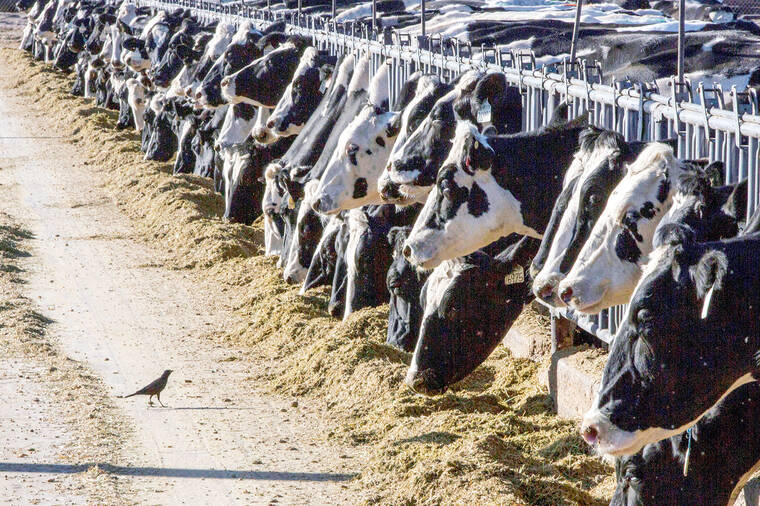Bird flu is spreading to more farm animals. Are milk and eggs safe?
A bird flu outbreak in U.S. dairy cows has grown to affect more than two dozen herds in eight states, just weeks after the nation’s largest egg producer found the virus in its chickens.
Health officials stress that the risk to the public is low and that the U.S. food supply remains safe and stable.
ADVERTISING
“At this time, there continues to be no concern that this circumstance poses a risk to consumer health, or that it affects the safety of the interstate commercial milk supply,” the U.S. Food and Drug Administration said in a statement.
Here’s what you need to know about bird flu and food:
• • •
WHICH STATES HAVE FOUND BIRD FLU IN DAIRY COWS?
As of Friday, the strain of bird flu that has killed millions of wild birds in recent years has been found in at least 26 dairy herds in eight U.S. states: Idaho, Kansas, Michigan, New Mexico, North Carolina, Ohio, Texas and South Dakota.
The virus, known as Type A H5N1, has been detected in a range of mammals over the last few years, but this is the first time it has been found in cattle, according to federal health and animal agencies.
• • •
HOW IS BIRD FLU AFFECTING FOOD PRODUCTION?
Agriculture officials in at least 17 states have restricted imports of dairy cattle from states where the virus has been detected, but, so far, government agencies say it’s had little effect on commercial milk production. Officials believe cows likely have been infected by exposure to wild birds, but said cow-to-cow spread “cannot be ruled out.”
Farmers are testing cows that show symptoms of infection, including sharply reduced milk supply and lethargy. Animals that show signs or test positive for illness are being separated from other animals on the farms. The animals appear to recover within two weeks.
U.S. egg producers are watching the situation closely after bird flu was detected in chickens in Texas and Michigan. Millions of birds have been killed, but the FDA said the risk of affected eggs getting into the retail market or causing infections in humans is low because of federal inspections and other safeguards.
• • •
DOES PASTEURIZATION KILL BIRD FLU?
Scientists say there’s no evidence to suggest that people can contract the virus by consuming food that’s been pasteurized, or heat-treated — or properly cooked.
“It’s not a food safety concern,” said Lee-Ann Jaykus, an emeritus food microbiologist and virologist at North Carolina State University.
Two people in U.S. have been infected with bird flu to date. A Texas dairy worker who was in close contact with an infected cow recently developed a mild eye infection and has recovered. In 2022, a prison inmate in a work program caught it while killing infected birds at a Colorado poultry farm. His only symptom was fatigue, and he recovered.
• • •
IS GROCERY STORE MILK SAFE?
Yes, according to food safety experts and government officials.
U.S. producers are barred from selling milk from sick cows and must divert and destroy it. In addition, milk sold across state lines is required to be pasteurized, or heat-treated using a process that kills bacteria and viruses, including influenza.
• • •
CAN YOU CATCH BIRD FLU FROM EGGS OR MEAT?
Only dairy cows, not beef cattle, have been infected or shown signs of illness to date, agriculture officials said. The largest egg producer in the U.S. temporarily halted operations on April 2 after finding bird flu in its chickens. Cal-Maine Foods culled about 1.6 million laying hens and another 337,000 young hens, after the detection.
The company said there was no risk to eggs in the market and that no eggs had been recalled.
Eggs that are handled properly and cooked thoroughly are safe to eat, said Barbara Kowalcyk, director of the Center for Food Safety and Nutrition Security at George Washington University.
“A lot of people like runny eggs. Personally, if I eat an egg, it’s very well cooked,” she said.


